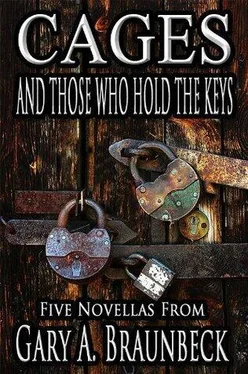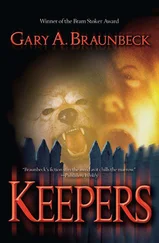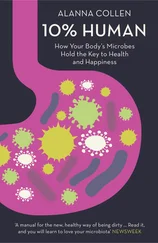“Alan? It’s me.”
No response.
She headed for the kitchen, stepping over innumerable pizza boxes and fast-food bags along the way. Her foot pressed down on something that was either growing brittle and stale or softening in decay; all she could be sure of was that it crunched under her foot and then squirted something thick and warm. She leaned against the wall and shook her foot until the muck fell away from the sole of her shoe, shimmering, landing in the center of long rug in the hallway. Leaning down, Marian saw that what she thought was light playing glissandos across its surface was actually a group of blowflies fighting for a prime location. She pulled in a deep breath, covering her mouth with her hand as she continued to the kitchen.
The table was cluttered with dishes holding the remnants of meals begun but never finished, now teeming with tiny crawling things she didn’t want to look at. The sink was filled with various pots and pans, their exteriors badly scorched, some of the burnt black flecking away and mixing with the off-white, fungal-looking matter that floated on the surface of the still water, bloating the moldy bits of food that sucked in the water like sponges.
The Alan she remembered would never have allowed the house to disintegrate like this.
She thought she heard a muffled sound somewhere nearby, then something small and sticky squirmed up her calf. Marian let out a sharp cry of revulsion and batted it away, then returned to the living room and its collection of familiar outfits waiting for occupants. “Alan? Come on, this isn’t funny. Are you here?” This was bad enough. Upstairs was worse.
Grandma’s favorite nightgown was spread upon the bed in the guest room, a Bible open next to the emptiness reaching from its right sleeve, a glass of orange soda sitting on the night stand next to the bed so she could have a drink if she was thirsty. That was always Grandma’s nightly routine.
The bathroom was unspeakable; great smears of what must have been rust covered the inside of the bathtub, the toilet lid was up, the rim of the bowl nearly overflowing with waste, and the sink looked to have been recently vomited in. Underneath everything was a scent of copper. The cumulative stench made her gag, but she managed to open the medicine cabinet above the sink and remove what she needed to clean and dress the wound on her hand, which she did out in the hall.
But the worst thing, the most terrible thing, was in Alan’s old bedroom.
On the bed lay his ex-wife Laura’s black silk robe, the sash still around its waist, opened to expose the bright red bra and panties arranged in their proper positions—
—and the glistening, well-used, wet indentation of the mattress under the crotch of the panties, as if—
— god, no. Alan would never do something like…like that.
Brother , she thought.
My brother.
What’s happened to you? Where are you now?
Marian shivered.
All through the house were the garments of the dead, the almost-forgotten, the moved-aways and just-lefts, awaiting someone to wear them, each carrying the scents of those who once did. Back downstairs, Marian debated whether to continue searching the house or just grab her coat and cut her losses. Something winked at her from the living room. She turned toward it. It winked again, bright and fiery. “Alan? Alan, please answer me if that’s you.” “Over here.” Though barely more than a whisper, his voice nonetheless startled her.
As her vision adjusted to the darkness, she saw her brother for the first time in what seemed an eternity; not a savior born under Bethlehem’s star, not possessing the greatness that led other men to become leaders and poets and visionaries, not a man who wanted to change the world or even harbored the abilities to do so; just a son, a brother, a fine boy, a decent enough man who’d brought no shame to his family’s good name, who’d studied for passing grades in school, who’d tried to build his own life with a fine woman by his side to love him, but then came the day she didn’t love him anymore and so left, and with her his will to believe himself special in any way.
He was sitting very still, watching the cigarette between his index and middle finger burn down until the heat threatened to singe his flesh. He was wearing an old baseball cap, its brim turned toward the back of his head like a baseball catcher without the mask. He was a man she barely recognized— hair too gray for his thirty-three years, eyes that were dark and hopeless, blueblack crescents underneath, lines etched so deeply into his skin they looked like cracks in plaster; he looked as if he’d crumble into dust if shaken hard enough.
From outside came the cries of “ Trick or treat, smell my feet, give me something good to eat! ”
Alan turned his head toward the gray of evening that swept in from a wide part between the curtains over the only window in the room. “What? Did you expect to find me holed-up in the john weeping endlessly into a cracked mirror?” He took along drag from the cigarette.
Marian followed his gaze.
We put a light in the window for you.
There was, indeed, a light there; a big, beautiful jack-o’-lantern, facing outside, the candle within burning brightly, welcoming lost children home. Why hadn’t she noticed that when she was on the front porch?
Because it wasn’t there , came the answer.
“Are you here because you want to be,” asked Alan, “or because Boots called you?”
“Because Boots called me.” “Boots” was their nickname for Aunt Lucille, their dad’s sister, for as far back as they could remember, though neither of them could have told you why she was called that.
Alan gave a short, empty laugh. “An honest one. I figured it was either Boots or Laura. God bless ‘em both.” He took another deep drag as he stared into the dim of fast-approaching night meandering in from the large window at the front of the house, bringing with it a grayness that did not so much cast shadows as rearrange them to suit the feelings of the thing that looked out from behind his eyes.
“I killed a man last night.”
Marian heard the words but did not allow them to register. She took a deep breath and crossed toward her brother. “Alan, listen, I know you haven’t been well, Laura told me, and I—”
“I really did it, you know. I really did. It helped. It helped a lot.”
Marian knelt down, took away the cigarette and crushed it in the ashtray, then held Alan’s hand between both of hers. “You look like hell. You need to get some sleep.”
“Did you say hello to Jack? He’s missed you quite a lot.” Alan adjusted the baseball cap, then turned on a small table lamp, the light revealing Jack slumped on the couch, his legs spread wide and twisted, his arms akimbo, the glow of his inner-candle fire nearly extinguished. He looked no different from a dozen other homemade figures on a dozen other porches tonight.
Except that he was still wearing Dad’s shirt.
Marian was too shocked to react right away.
Between Jack and her First Communion dress lay a thick, neatly-folded coverlet, its patchwork surface a mosaic of colors and shapes.
The Story Quilt, a family heirloom passed down from nearly a century-and-a-half ago, a perpetual work-in-progress; through various descendants to her great-grandmother to her grandmother to her own mother, the Story Quilt had always been a constant in Marian’s life. Her mother had hoped Marian would continue working on it when the time came. Marian shivered at the thought; Mom had been working on it the day she’d suffered the stroke that would kill her within a few hours. Marian couldn’t bring herself to touch the damn thing after that.
Читать дальше












